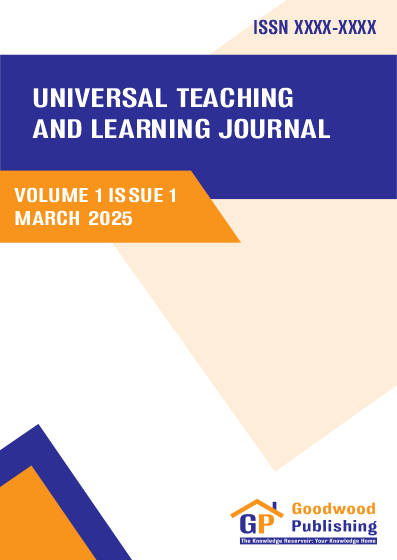Article Details
Vol. 1 No. 1 (2025): March
Developing an islamic adab-based teacher leadership model to improve teacher performance in Islamic boarding schools
Abstract
Purpose: This study aimed to improve teacher performance by improving the quality of teacher leadership.
Research methodology: This study applies the Borg and Gall development model, with teachers as subjects. The study aims to identify teachers’ needs for an Islamic manners-based leadership model, design and develop its prototype, evaluate its validity and practicality, and assess its effectiveness. Data from experts and practitioners were collected through observations, surveys, and assessment sheets and analyzed using quantitative and descriptive methods.
Results: The study shows a high need for Islamic adab-based leadership. The prototype, which comprised structured steps and components, achieved high validity (3.66) and practicality (3.20). Its application significantly improved teacher performance, with normality > 0.05, t-test < 0.05, moderate N-Gain (0.60), and 58% effectiveness.
Conclusion: The Islamic adab-based teacher leadership model effectively improves teacher performance, demonstrating high validity and practicality, and fostering competence and moral integrity in both teaching and mentoring roles.
Limitations: The study’s limitations include its focus on one institution, a small sample size with short implementation, and reliance mainly on teacher perspectives without broad input from students or parents.
Contribution: This study develops a validated Islamic adab-based leadership model that enhances teacher performance, upholds ethical standards, enriches faith-based education literature, and offers practical guidance for educators and policymakers.
Keywords
How to Cite
Download Citation
References
- Akkaraputtapong, P., Nguyen, H. T. M., Ngo, H. T., & Ngo, N. T. H. (2025). A teacher leadership model validation for in-service teachers. Paper presented at the Frontiers in Education.
- Ardiansyah, M. (2020a). Catatan Pendidikan: Refleksi Tentang Nilai-nilai Adab dan Budaya Ilmu dalam Islam. Depok: Attaqwa.
- Ardiansyah, M. (2020b). Konsep Adab Syed Muhammad Naquib Al-Attas dan Aplikasinya di Perguruan Tinggi. Depok: Yayasan Pendidikan Islam At-Taqwa Depok.
- Çetinkaya, A., & Arastaman, G. (2023). The role of motivation to lead in teacher leadership. Journal of Qualitative Research in Education(35). doi:https://doi.org/10.14689/enad.35.1731
- Daniëls, E., Hondeghem, A., & Dochy, F. (2019). A review on leadership and leadership development in educational settings. Educational research review, 27, 110-125. doi:https://doi.org/10.1016/j.edurev.2019.02.003
- Dardenne, M. K. (2014). A Qualitative Case Study Investigation Into Character Education Experiences in One Urban Middle School Setting.
- Day, C., Harris, A., & Hadfield, M. (2001). Grounding knowledge of schools in stakeholder realities: A multi-perspective study of effective school leaders. School leadership & management, 21(1), 19-42. doi:https://doi.org/10.1080/13632430120033027
- Esen, M., Bellibas, M. S., & Gumus, S. (2020). The evolution of leadership research in higher education for two decades (1995-2014): A bibliometric and content analysis. International Journal of Leadership in Education, 23(3), 259-273. doi:https://doi.org/10.1080/13603124.2018.1508753
- Fitriasari, S., Masyitoh, I., & Baeihaqi. (2020). The Role of Pancasila Education Teachers and Citizenship in Strengthening Character Education Based on Pancasila Values.
- Garay Abad, L., & Hattie, J. (2025). The impact of teaching materials on instructional design and teacher development. Paper presented at the Frontiers in Education.
- Hake, R. R. (2002). Relationship of individual student normalized learning gains in mechanics with gender, high-school physics, and pretest scores on mathematics and spatial visualization. Paper presented at the Physics education research conference.
- Luo, X., Alias, B. S., & Adnan, N. H. (2024). Exploring the interplay between teacher leadership and self-efficacy: A systematic literature review (2013–2024). Education Sciences, 14(9), 990. doi:https://doi.org/10.3390/educsci14090990
- Mulyasa, H. (2020). Menjadi guru profesional menciptakan pembelajaran kreatif dan menyenangkan.
- Mushawir, A., Arqam, M., Rambe, M., & Lubis, R. (2025). Understanding the Role of Educators: Teachers’ Awareness of Character Education in Indonesia. Urwatul Wutsqo: Jurnal Studi Kependidikan dan Keislaman, 14, 180-195. doi:http://dx.doi.org/10.54437/urwatulwutsqo.v14i1.2014
- Nuriman, N., & Fauzan, F. (2017). The Influence of Islamic Moral Values on the Students’ Behavior in Aceh. Dinamika Ilmu, 17. doi:http://dx.doi.org/10.21093/di.v17i2.835
- Putrawan, I. (2020). Kepemimpinan Guru dalam Perilaku Organisasi Beberapa Konsep dan Langkah-Langkah Pengukurannya: Bandung: CV. Alfabeta.
- Richard, H. R. (1999). Analyzing change/gain score. American Educational Research Association’s Division Measurement and Research Methodology.
- Sary, F. P., Farihin, A., Tamam, B., Prasetio, A. P., & Rahmatika, A. F. (2024). The influence of leadership on factors related to teachers in Islamic boarding schools. Edelweiss Applied Science and Technology, 8(5), 26-39. doi:https://doi.org/10.55214/25768484.v8i5.1628
- Sawalhi, R., & Amatullah, T. (2023). Teachers' Perspectives of the Manifestation of Teacher Leadership in Islamic Schools. International Journal of Teacher Leadership, 12(1), 47-62.
- Setiyono, A., Suti'ah, S. a., Mulyadi, M., & Hidayati, S. (2024). Principal Strategy Through Academic Supervision to Improve Teacher Professionalism in Islamic Educational Institutions. Contemporary Research Analysis Journal, 01. doi:http://dx.doi.org/10.55677/CRAJ/02-2024-Vol01I3
- Succarie, A. (2024). Examining the implications of Islamic teacher education and professional learning: Towards professional identity renewal in Islamic schools. Education Sciences, 14(11), 1192. doi:https://doi.org/10.3390/educsci14111192
- Sugiyono, P. (2019). Metode Penelitian Kuantitatif Kualitatif dan R&D. Bandung: Alfabeta.
- Suharto, D. N. (2020). The Effect of Celebrity Endorsement and Trust on Purchasing Decisions. SSRG International Journal of Economics and Management Studies, 7, 72-77.
- Suharto, S. (2020). VIRAL MARKETING, E-WOM AND CUSTOMER LOYALITY. International Journal of Management, 11(8).
- Supardi, S. (2013). Kinerja Guru: RajaGrafindo Persada.
- Syarif, A., & Riza, K. (2022). Pengaruh Kepemimpinan Transformasional, Disiplin Kerja dan Komunikasi Terhadap Kinerja Pegawai pada Dinas Pendidikan Kepulauan Riau. Jurnal Humaniora dan Ilmu Pendidikan, 2(1), 33-41.
- Yahya, Y., & Yani, D. A. (2023). Pengaruh Pengembangan Sumber Daya Manusia dan Motivasi Kerja terhadap Kinerja Pegawai pada Kantor Kelurahan Blambangan Umpu Kecamatan Blmbangan Umpu. Jurnal Relevansi: Ekonomi, Manajemen dan Bisnis, 7(1), 47-62.
License

This work is licensed under a Creative Commons Attribution-ShareAlike 4.0 International License.

